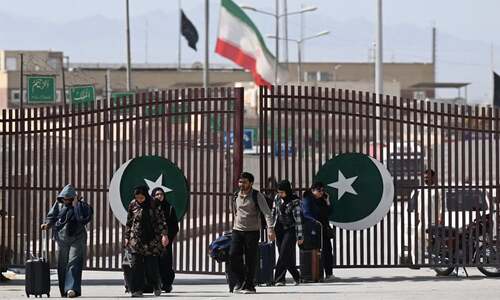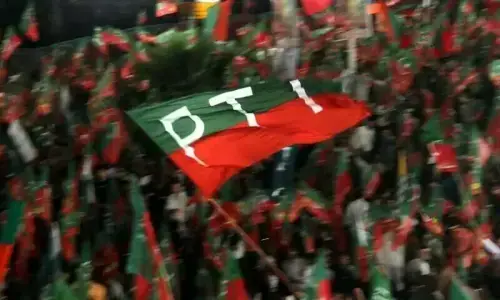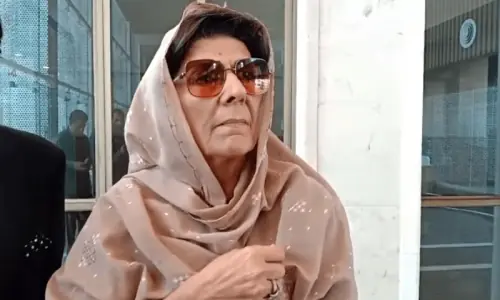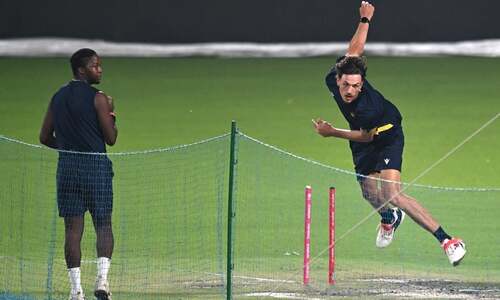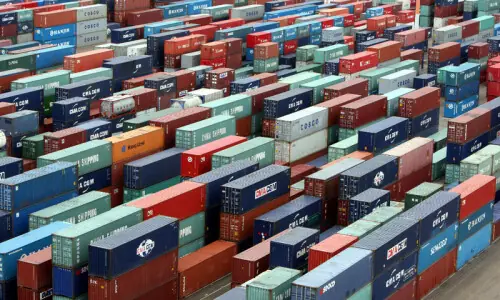GARHI KHUDA BAKHSH, April 7: A cancelled rally, a loathed president and a party chairman kept out of the public glare because of Taliban threats -- Gulzar Ali Khawaja has never seen anything like it.
For the first time in his life, the once ardent supporter of the Pakistan People’s Party, which led the coalition government for five years, says he won’t be voting in the general election on May 11 and doesn’t mince his words about why.
Furious, with his face red under the hot sun, he cannot believe that no major party leader addressed the crowds on one of the most sacrosanct dates — the anniversary of the April 4, 1979 hanging of PPP founder, Zulfikar Ali Bhutto.
“I come here all the way from Karachi to pray on the anniversary and they can’t come?” said the 45-year-old property dealer, who drove nine hours from Karachi to the Bhutto ancestral seat in Garhi Khuda Bakhsh.
“President Asif Ali Zardari has spoiled the party,” he said.
The PPP announced it would kickstart its campaign for re-election after five years in office with a large rally on April 4, but then cancelled it.
President Asif Ali Zardari and his son, Bilawal, addressed a small gathering, closed to all but state media, in the middle of the night.
Bilawal, the PPP’s star attraction, appeared uncomfortable, speaking haltingly in heavily accented Urdu, a mark of his upbringing in England and Dubai.
He stumbled through the outgoing government’s achievements before asking listeners to “promise” to vote for “Aunty Faryal” — Zardari’s sister — who is contesting the Bhutto family seat.
Few party faithful who gathered at the shrine were impressed.
“Bilawal should not listen to anyone and come out into the public to see the workers as his mother and grandfather did,” Khawaja said.
In contrast, their main rivals, Pakistan Tehreek-i-Insaaf chief Imran Khan and Pakistan Muslim League-Nawaz chief Nawaz Sharif, have kicked off their campaigns drawing tens of thousands.
PPP spokesman and former cabinet minister Qamar Zaman Kaira said that the party respected people’s desire to see Bilawal but said the danger was too great.
“We can’t expose Bilawal to the real threat of terrorism. We can’t risk the life of another top leader,” he said.
The Taliban have directly threatened the PPP and its main coalition partners, the ANP and MQM, often described as “secular”.
During Pakistan’s last election campaign, Ms Bhutto defied repeated threats to address enormous rallies across the country.
When she was killed in a gun and suicide attack after an election rally in Rawalpindi in 2007, it shocked the party and the country.
Aged 24, Bilawal is chairman of the party but ineligible to run for office until his 25th birthday in September. Analysts say he appears uncomfortable in public and needs to work hard on improving his language skills.
President Asif Ali Zardari, said to be deeply paranoid about security, is also rarely seen in public. He remains deeply unpopular over a multitude of corruption allegations.
“We want Bilawal to come here, to see us, to talk to us and address the workers’ problems. We miss the love and affection of his mother and grandfather,” says Muhammad Urs, 41, who sells snacks in the Garhi Khuda Bakhsh market.
Urs, a life-time PPP voter, threatened not to cast his ballot “until they come and talk to us”.
But the PPP’s Kaira dismissed big rallies as winners of elections, instead pointing to television and the Internet to reach larger audiences, even though the percentage that has regular online access is tiny.
“We believe that our message is going all over,” he said.
But Muhammad Panah Soomro, a labourer in the village of Bangaldero, not far from the Bhutto shrine, is furious.
“I will show them my shoe if they will come here to seek my vote,” he said. The roof of his two-room house was blown off by heavy rain and he has no money to replace it.
“Bilawal doesn’t come here. He’s a rich man and lives abroad. His father is the biggest goon and has looted away his mother’s party and wealth,” said Soomro.
Critics point out that the PPP has presided over the country as the economy has worsened and security has deteriorated and they blame it for failing to do more to improve people’s lives.
They say that a dynastic party, obsessed with the martyrdom of its fallen leaders and pilloried for corruption and incompetency, is losing touch with the centre-left progressive ideology on which it was founded in the 1960s.
Rasul Bakhsh Rais, a social sciences lecturer at Lahore University of Management Sciences, says that despite the security threat restricting PPP rallies, candidates have been campaigning well at the grassroots level.
“I expect them to put a good show. It’s not possible to predict now how big a victory they will gain and whether they will form the next government or not, but I think they will get good results.”—AFP

